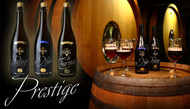Belgian Beer recognised by UNESCO as Intangible Cultural Heritage.
Posted by Isabelle Bellet on 16th Apr 2019
UNSECO listed Belgian brewing art as a World Heritage Site in 2016.
Belgian beer, a tradition worthy of protection in the same way as French gastronomy or Argentine tango.
According to the 2003 UNESCO Convention, cultural heritage includes the traditions inherited from our ancestors and always practised through transmission from generation to generation (performing arts, social practices, rituals, festive events, craftsmanship...). This heritage is representative of a great cultural identity and diversity.
My 5 main explanations for the success of Belgian beer
1) The diversity of Belgian beer
It is the unparalleled diversity of Belgian brewing art that has made it possible to recognize it in comparison with other beer-producing countries.
Nearly 1,500 different beers are produced in the country using various fermentation methods. Several regions are known for their specific varieties: Gueuze-lambics are still brewed in Brussels and Pajottenland, according to the principle of spontaneous fermentation, Saison beers are brewed mainly in Wallonia and "old brown" beers in West Flanders,
It is this diversity of fermentation methods, from Pils, Abbey beers, Seasons beers, Trappists, Flemish Old Brown Beers, to the most elaborate lambics and Gueuzes, that is rewarded by Unesco. A wealth of styles and rare creativity.
2) Beer is an integral part of Belgian history.
It was the drink of the monks, who mastered its production and know-how, allowing them to drink beverages purified of the diseases that have ravaged Europe in past centuries. This activity has also allowed them to keep their community alive over the centuries.
Many breweries have been founded within these monasteries and abbeys and have perpetuated this know-how (for example Val Dieu founded in 1216, Brasserie Roman founded in 1545, Brasserie St-Feuillien founded in 1873, Brasserie De Bosteels - Karmeliet - founded in 1791.
Some monasteries continue to produce their beer in their communities, the famous Trappist beers such as Westmalle, Rochefort or Chimay, which donate their profits to charitable associations.
As early as the Middle Ages, many farms produced beer in winter, to quench the thirst of all their farm workers in summer, a safer drink than water, responsible at the time for many diseases. This beer is at the origin of Saisons beers. These farms continued to brew and thus became true brewing institutions, such as the Dupont brewery founded in 1759, the Dubuisson brewery founded in 1769 and the Du Bocq brewery founded in 1858.
3) The Beer Heritage
Many historical breweries continue to brew according to the same traditional recipes, handed down from generation to generation, sometimes for 5 generations.
Today, knowledge and skills are passed on by master brewers who run courses in breweries. Specialized courses for students training in this trade and in hotel trades in general, as well as public training programs for entrepreneurs and small test breweries for amateur brewers, are very successful.
Belgium has demonstrated its ability to keep its heritage alive through its education, its numerous beer festivals, highlighting the ancestral know-how of its brewers.
4) Belgian beer is an Art
Brewing is an art in Belgium. Many recipes are developed with passion. Gueuzes, for example, made of young and older lambics, preserved and aged in oak barrels, are made by blending according to the inspiration of the "gueuze cutter".
In addition to these centuries-old breweries, there are also new brewers who work every day on new recipes and try something new.
Since the 1980s, artisanal beer, bringing together new actors, has become particularly popular.
5) Beer is part of life
Beer is much more than a festive consumer product in Belgium. It is certainly drunk in the evening or as an aperitif, but also more and more at the table: Belgian (and French) restaurateurs practice food-pairing (the beer-plat agreement). It is served with cheese, or any food. Each dish has its own beer or beers. In short, in Belgium, people drink beer like nowhere else.
A Belgian drinks 74 litres of beer per year, or one glass per day.
Every Belgian beer has its own story that is told around a good table.
No wonder Belgium is considered the land of beer!

